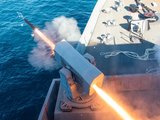USCG accepts 20th FRC
The US Coast Guard (USCG) has accepted delivery of its 20th Sentinel-class fast response cutter (FRC), USCGC Lawrence Lawson, it announced on 21 October.
This will be the second FRC to be stationed at Cape May, New Jersey, following its commissioning in early 2017.
The USCG is acquiring 58 Sentinel-class FRCs that will patrol coastal regions of the US and replace the 110ft Island-class patrol boats. The FRCs are 154ft in length and have an endurance of five days. They have command, control, communications, computers, intelligence, surveillance and reconnaissance equipment and can launch and recover standardised cutter boats from side davits or from astern.
A total of 38 FRCs have been ordered so far from Bollinger Shipyards, with 18 already in service: six each in Key West, San Juan and Miami. The 19th FRC will be commissioned in November 2016 and station at Cape May.
Related Equipment in Defence Insight
More from Naval Warfare
-
![European navies line up $105.8 billion in unawarded contracts for 2026]()
European navies line up $105.8 billion in unawarded contracts for 2026
France, Germany and Italy lead the way on unawarded naval defence opportunities that could be awarded this year, but across Europe countries are ramping up their spending efforts to face geopolitical challenges.
-
![Spain’s F100 upgrade mirrors Aegis modernisation paths in allied navies]()
Spain’s F100 upgrade mirrors Aegis modernisation paths in allied navies
The Spanish Navy’s Alvaro de Bazan-class of air defence frigates will receive the latest Aegis Weapon System technology among other modernisations to extend the service life to 2045.
-
![UK’s Fleet Solid Support ship programme deemed on track despite steel supply concerns]()
UK’s Fleet Solid Support ship programme deemed on track despite steel supply concerns
Shipbuilders are saying the programme is going ahead on time as the government estimates 7.7 million tonnes of steel are needed for 2026 infrastructure projects.
-
![Raytheon unveils details of its proposal for the US Navy/NATO ESSM Next Significant Variant]()
Raytheon unveils details of its proposal for the US Navy/NATO ESSM Next Significant Variant
In an exclusive interview with Shephard, Raytheon’s VP of Shipboard Missiles disclosed what improvements the company plans to offer for the Sea Sparrow NSV.























